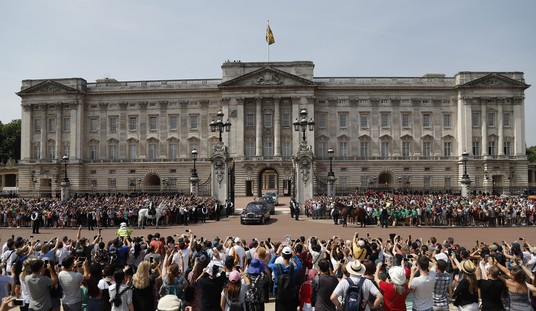The West is rightly fretting over where the Arab revolutions will bring us, but there’s one we can be thankful for in Syria. Secretary of Defense Robert Gates had it right when he said that the Syrian military should follow the example of Egypt’s that “empowered a revolution.” Secretary of State Hillary Clinton had it wrong — amazingly wrong — when she said that members of “both parties who have gone to Syria in recent months have said that they believe he [Bashar Assad] is a reformer.”
Bashar Assad’s regime is anti-American to the core and is tied at the hip to Iran. It has supported elements of al-Qaeda; preaches radical Islam despite its secular governance; is a major backer of Hamas, Hezbollah and Palestinian Islamic Jihad; and has the blood of countless U.S. soldiers and Iraqis on its hands. The Iraqi government even tried to build support for a UN tribunal to prosecute Syrian officials for destabilizing Iraq in 2009. You’d be hard-pressed to find an uprising more worthy of the West’s support, at least politically.
The only argument that exists to oppose U.S. support for the uprising is that it could benefit Islamists. After all, Hafez al-Assad had to carry out a massacre at Hama in 1982 to crush the Muslim Brotherhood. At the same time, it is unlikely that the Islamists will be the sole leaders of a post-Assad Syria. They will have to share power with secular democratic forces, and it must be remembered that Assad already vigorously supports the terrorist groups that, it is feared, an Islamist-governed Syria would.
Assad is well-aware of this fear and uses it to his advantage. For example, he did not arrest the late Abu Qaqa, an anti-American cleric who called for establishing Sharia law. While secular demonstrations for freedom were prohibited, Qaqa was allowed to hold anti-American rallies for Western consumption. His right-hand man believes he was a government agent, and his funeral was attended by Baathist officials. The goal of using Qaqa was two-fold: to have a front with which to connect with anti-American jihadists and to encourage the illusion that the only alternative to Assad is rule by Islamic extremists of the worst kind.
The same thinking was behind Assad’s orchestration of riots in Syria in February 2006 in reaction to the publication of the cartoons mocking Mohammed. As a confidential source told the U.S., the message was: “This is what you will have if we allow true democracy and allow Islamists to rule,” and that “we are the only thing standing between you and the Islamist hordes.” Now, one of Assad’s advisors is attributing the uprising to the influential Muslim Brotherhood theologian Sheikh Yousef al-Qaradawi, and of the approximately 270 political prisoners released, only 14 were not Islamists. The regime made the decision that it works to its advantage to showcase its Islamist opposition, rather than the secular activists (especially women) like Suhair Atassi.
The Reform Party of Syria, a U.S.-based democratic opposition group, estimates that only about 20 percent of the population is Islamist. Activist Ahed al-Hendi, a former political prisoner in Syria who was released in 2007 and is now the Arabic program coordinator at CyberDissidents.org, told me during an interview for FrontPage Magazine that he doesn’t believe the Muslim Brotherhood would take over Syria if Assad falls.
“I lived most of my life in Syria and I have met lots of Sunnis who consider applying Sharia law in Syria to be a joke despite the fact that most of them are observant Muslims,” he said. Secular opposition leader Riad al-Turk agrees that Assad is “using the threat of the Islamists taking over and arguing that our people are not yet qualified to practice democracy.”
Syria is currently ruled by the Allawite minority that only represents 10 to 13 percent of the population. A poll from last year shows that the top issue of the population is political freedom, followed by corruption. Only six percent said that the possibility of war is their top concern, despite the constant beating of the drum by the regime. The desire for freedom and accountability among the population is Assad’s weak point.
It is time for the West to begin supporting the uprising by pressuring Assad. The release of political prisoners should be demanded and their stories recited to the world. The assets of those behind the violence should be frozen and they should be warned of prosecution. The Arab League and other international bodies can be pressured to address the violence and even if they do not, the resulting attention will help energize the opposition.
The U.S. and Europe can call for further sanctions over Syria’s refusal to grant the IAEA access to all of its suspected nuclear sites and its unwillingness to answer questions about the nuclear reactor bombed by the Israelis in 2007. Credible intelligence about the corruption in the regime can be presented, as can information about the influence of Iran on the regime — such as the possible use of the Revolutionary Guards to attack protesters. If the West wants to get really aggressive, it can supply the Syrian secular opposition with funding and non-violent material aid, as was done in Eastern Europe to help end the Cold War.
It’s time for the West to get realistic about Bashar Assad the “reformer” and the opportunity that exists to at the very least cause him enormous stress, if not bring him down. Syria of 2011 should not become Iran of 2009.









Join the conversation as a VIP Member